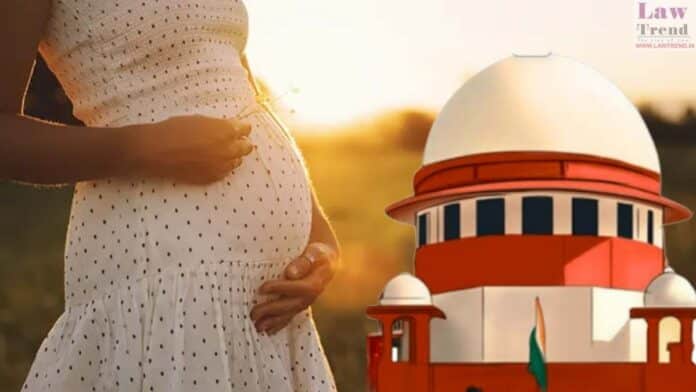A plea has been filed in the Supreme Court challenging the rules issued by the union health ministry which prohibit donor gametes to couples desirous of having children through surrogacy on the ground that it frustrates the provisions of the Surrogacy (Regulation) Act, 2021, which gives the right of parenthood to infertile couples.
Gametes are reproductive cells. In animals, the male gametes are sperms and female gamete is the ovum or egg cells.
On March 14, 2023, the Ministry of Health and Family Welfare published General Statutory Rules (GSR) 179 (E) which said: (1) couple undergoing surrogacy must have both gametes from the intending couple and donor gametes are not allowed (2) single women (widow/divorcee) undergoing surrogacy must use self eggs and donor sperms to avail surrogacy procedure.
Section 2(h) of The Assisted Reproductive Technology Regulation Act, 2021 defines “gamete donor” as a person who provides sperm or oocyte with the objective of enabling an infertile couple or woman to have a child.
A vacation bench of Justices Bela M Trivedi and Prashant Kumar Mishra is scheduled to hear on Tuesday the plea filed by Nalin Tripathi through advocate Abhikalp Pratap Singh.
“The said GSR has the effect of frustrating the provisions of the Surrogacy (Regulations) Act, 2021- which is a welfare legislation giving right of parenthood to infertile couples. The said GSR is not only violative of Article 14 and 21 of the Constitution of India, but is also contrary to the objectives of the enactment; therefore the instant Writ Petition is being filed under Article 32 of the Constitution of India, 1950,” the plea said.
It said infertility has significant negative social impact on the lives of infertile couples, particularly women, who frequently experience violence, divorce, social stigma, emotional stress, depression, anxiety and low self-esteem.
“Women in this country have since ages been forced to undergo the stigma of infertility and ‘Infertility’ is seen as a major problem as kinship and family ties are dependent on progeny. Hence surrogacy comes as a supreme saviour for the institution of marriage,” the petition said.
It said pursuant to the 228th report of the Law Commission on “Need of Legislation to regulate Assisted Reproductive Technology Clinics as well as Rights and Obligations of the parties to Surrogacy”, and the Indian Council of Medical Research’s (ICMR) draft of “Assisted Reproductive Technology (Regulation) Bill and Rules 2008”, two laws were passed by Parliament after deliberations namely– The Assisted Reproductive Technology (Regulation) Act, 2021 and The Surrogacy (Regulation) Act, 2021.
The plea referred to the section (h) of The Assisted Reproductive Technology Regulation Act, 2021 which defines “gamete donor” and said, “Thus, it is clear that the legislature in its wisdom acknowledged the role of ‘gamete donor’ as an important constituent in the field of Assisted Reproductive Technology/Surrogacy Procedure”.
It said, however, in exercise of its powers under section 50 of The Surrogacy (Regulation) Act, 2021, GSR number 179 (E) dated March 14, 2023 was published wherein attempt has been made to interpret the term “genetically related”.
“Permitting donor gametes for IVF and single women; but prohibiting donor gametes in case of couple undergoing surrogacy, is not only violative of the principles of Equality but is perceived to be a malafide attempt to frustrate the provisions of the Surrogacy (Regulations) Act, 2021 [a beneficial legislation] giving right of parenthood to infertile couples,” it said.
The petition said doctors opine that if one or more of the following conditions exist, opting for donor eggs is perfect.
Also Read
“Decreased ovarian reserve where your eggs are of poor quality usually because of age, if a genetically transmitted disease could be passed on to the child due to normal conception, a history of failed IVF where your doctor thinks that poor egg quality is responsible, recurrent miscarriages, low AMH count and age on the higher side,” it added, while referring to the opinion of doctors, reports of Law Commission and ICMR, which acknowledges the use of donor gametes.
It said the Centre has, in an affidavit before the Delhi High Court, averred that surrogacy laws were enacted following the due procedure with an intention to restrict the commercialisation of embryos and newborns and, if the provisions of the statute are diluted, it would defeat the whole purpose of the law.
“But by introducing GSR 179 (E) the respondent (Ministry of Health and Family Welfare) itself is trying to defeat the purpose of the law; hence it is submitted that the respondent cannot be permitted to blow hot and cold together,” the plea said.
It sought a direction to the Centre to quash the GSR 179 (E) dated March 14, 2023, as it is violative of Articles 14 and 21 of the Constitution of India.
A batch of writ petitions challenging the provisions of the Surrogacy (Regulation) Act, 2021 and the Assisted Reproductive Technology Act, 2021 is already pending before the top court.




